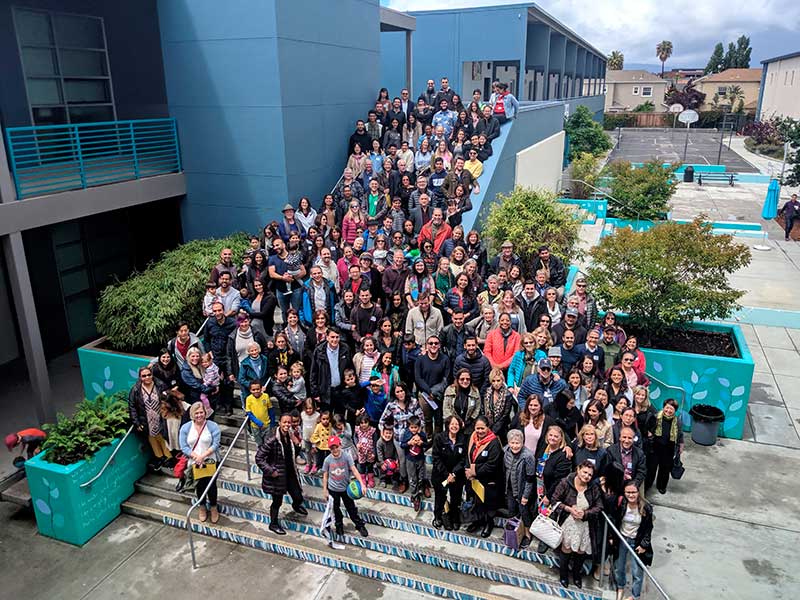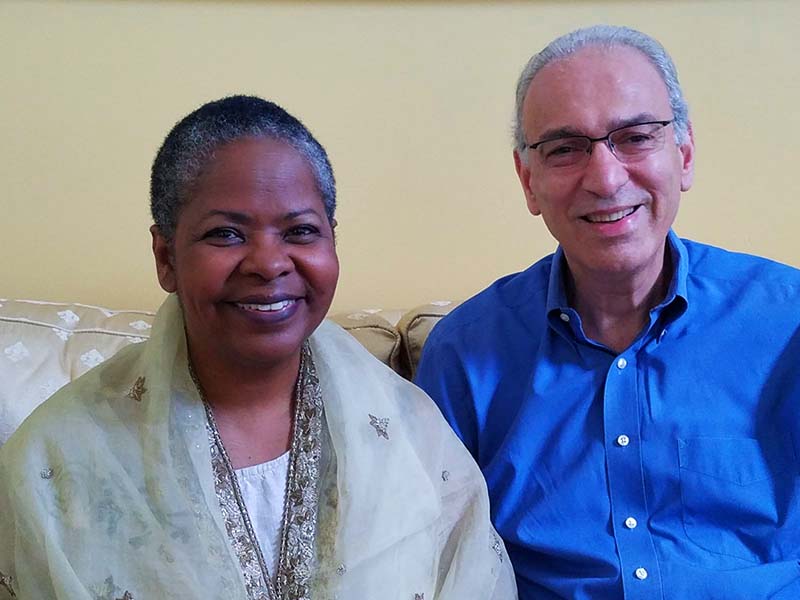
Nashville study group experiences breakthrough in racial understanding
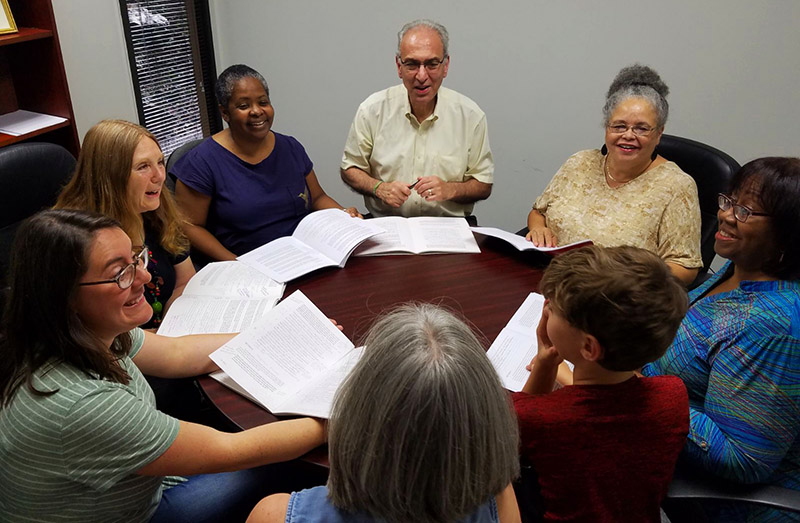
Carol Grady Mansour had been a reluctant participant in study circles designed to train people for Baha’i-initiated efforts to build community where they live.
“I would participate in a course out of obedience or only if I couldn’t come up with a good excuse not to,” she reflects. “If the opposite of love is not hate but apathy, that was my attitude toward the Ruhi [Institute] sequence” of classes.
Here was her dilemma: “If race prejudice was the most vital and challenging issue facing the American Baha’i community, why were we spending so much time on everything except that?”
All that changed for the Arrington, Tennessee, Baha’i with a study circle using Ruhi Book 1, Reflections on the Life of the Spirit, facilitated in the Nashville area starting in July 2018 by Sue St. Clair and Shereen Cook.
In that study circle, Mansour says, “We were asked to view each of the quotes [from Baha’i writings] in Book 1 through the prism of eliminating race prejudice. For example, ‘The betterment of the world can be accomplished through pure and goodly deeds, through commendable and seemly conduct.’”
Looking at the quotes that way gave Mansour, who is African American, and other participants an opportunity to contemplate such questions as “In the realm of eliminating race prejudice, what would pure and goodly deeds look like?” and “What are some examples of commendable and seemly conduct that would help eliminate race prejudice?”
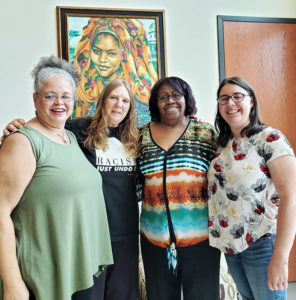
St. Clair says she and Cook drew inspiration for the study circle from this passage from a 2014 letter of the Universal House of Justice:
“As a result of their training and deepening, a growing number of believers will draw insights from the Writings to sensitively and effectively address issues of racial prejudice that arise within their personal lives and families, among community members, and in social settings and the workplace.”
Reading that, St. Clair says, she and Cook realized that they could begin “to awaken to our own internal racist, prejudiced and/or biased attitudes, beliefs and behaviors … with the very first Ruhi course.”
“We decided to invite several individuals to be participants in the course with the focus on: How do we view the quotes in the light of each one helping us to recognize and then address racist views in our own hearts” and bring about a “betterment of the world through pure and goodly deeds, through commendable and seemly conduct” that is “consciously less racist, less prejudiced or less biased, each day?”
She recalls, “We discussed how, as we are transforming our own hearts, we can affect the hearts of those with whom we come in contact.”
First, though, “We made sure we had a common understanding of what was meant by ‘betterment of the world’ and ‘commendable and seemly conduct’ as it relates to healing racism, for example.”
Adds Cook, “I was surprised at how each quote in Book 1 could apply to the issue of eliminating racial prejudice so thoroughly, even in the ‘Life and Death’ section!
“The [National Spiritual Assembly] has urged us to consider how the issue of eliminating racial prejudice can be infused into all of our activities and how the [training] process can be a tool toward this end.”
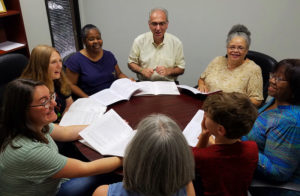
Other practices associated with Ruhi courses were adhered to, says St. Clair, such as memorizing quotes and sharing prayers with neighbors and friends.
Cook, though, would like to “learn more about how we can move into the realm of action.” “Although we discussed the study of a prayer component, practiced it among ourselves and encouraged its practice outside of the group, we didn’t carry out home visits in an organized fashion, primarily because all of us participating had already done the course previously,” she says.
“However, I think learning to share prayers about unity and carry out cross-cultural home visits specifically targeted at healing racism would be a wonderful action component for future efforts.”
When the units of the course were completed in December 2018, the study circle went back over questions reworded from the book’s original text “to capture the learning in focusing on the quotes for the healing of racism,” says St. Clair.
The questions as they reflect this study circle’s focus:
Unit One – Understanding the Baha’i Writings
- How does the practice of reading the Baha’i Writings morning and evening aid in healing racist attitudes and behaviors?
- How might the study of the section on good deeds help with healing relationships between black and white?
- What role do you see truthfulness having in eliminating racial superiority/inferiority in community building?
- How does a kindly tongue aid us in recognizing the humanity in each of us?
- What benefit does the law not to backbite or gossip have in healing racism?
Unit Two – Prayer
- How does studying prayers together aid us in building open, diverse communities?
- Do prayers have power to awaken us to the barriers to racial harmony? Give examples.
- As it relates to the disease of racism in our society, how can prayer act as a consuming fire?
- What transformative changes, regarding racism, can we identify and watch for within ourselves, each other and the community as we pray regularly together?
- What actions accompanying prayer are also needed to accomplish racial harmony in the community?
Unit Three – Life and Death
- What is the true purpose of life in this world?
- How might the soul “manifest the signs of God and His attributes in dealing with the disease of racism?”
- What is “the fruit of man’s earthly existence?” How does recognition of this achieve racial harmony?
- How does the work of racial justice, done with a prayerful attitude, help to reveal man’s latent role as the supreme Talisman?
- Unravel the unique role of people of African descent as “the pupil of the eye.”
For Mansour, the course was revelatory. “I went from feeling ‘ho hum’ about Ruhi to seriously considering becoming a tutor, just so I could facilitate Book 1 (or other books) with a specific focus on race.
“For the first time I understood that when the Universal House of Justice,” the global governing council of the Baha’i Faith, “described the core activities as a framework, it meant that the activities as briefly outlined weren’t the finished product.”
It’s like being told to build a dwelling, she says, “but we never considered one with stained glass windows, or a skylight, or a balcony, or solar panels, or thermal floors, just because our imaginations had been limited. This for me was a game changer.”


